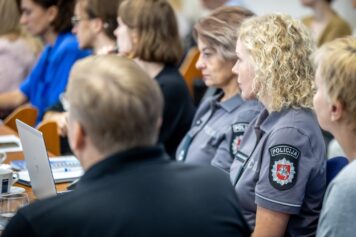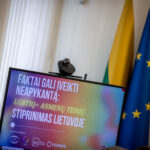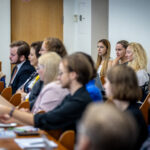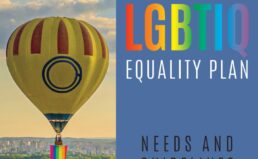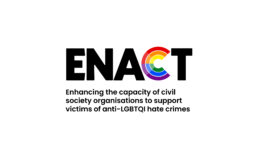On August 30th, the Office of the Seimas Ombudsmen in Lithuania hosted a significant discussion titled “Facts Can Overcome Hate: Strengthening LGBTIQ+ Rights in Lithuania.” This event brought together representatives from state institutions, agencies, law enforcemement, researchers and academia as well as non-governmental organizations to address critical issues facing the LGBTIQ+ community.
Seimas Ombudswoman and Head of Seimas Ombudpersons’ Office dr. Erika Leonaitė emphasized the importance of discussing measures to better ensure LGBTIQ+ rights and equality. She noted, “We constantly observe attempts by some politicians and members of society to promote and deepen societal polarization, dividing people into those worthy of fundamental rights and those they want to leave on the margins. Intolerance towards LGBTIQ+ individuals often leads to intolerance towards other social groups.”
The discussion focused on key challenges and ongoing and planned measures aimed at ensuring LGBTIQ+ rights and creating an inclusive environment in areas such as education, public information, healthcare, and protection against hate crimes, as well as the Implementation of Council of Europe Recommendation CM/Rec(2010)5, a landmark instrument to combat discrimination based on sexual orientation and gender identity. As part of the third pan-European assessment of this recommendation’s implementation, the National LGBT Rights Organization LGL has contributed to a comprehensive civil society organization (CSO) report.
Key Findings from LGL’s Assessment:
- Legal Protections: Gender identity and expression lack explicit protection in Lithuanian law.
- Gender Recognition: The current process requires medical diagnosis and court approval, falling short of accessibility and self-determination standards.
- Same-Sex Partnerships: No legal recognition exists for same-sex couples, with slow progress in addressing LGBTIQ needs.
- Asylum Procedures: Discriminatory treatment and insufficient assessment of individual needs persist, especially for LGBTIQ persons with intersecting identities.
- Healthcare: New protocols for transgender healthcare are criticized for lack of coverage and inaccessibility. Gender-affirming surgeries are virtually unavailable, and hormone treatments are not reimbursed.
- Education: Significant barriers to LGBTIQ-inclusive education exist, exacerbated by the ‘anti-gay propaganda’ law.
- Intersectionality: Limited data on gender identity and expression hinders addressing issues faced by LGBTIQ individuals with multiple marginalized identities.
- Hate Crime: Significant gaps in Lithuania’s hate crime response, including underreporting, lack of specialized law enforcement units, and insufficient victim support.
© Augustas Didžgalvis photography
Ongoing Projects and Research
A project titled “More Effective Protection of LGBTI Rights by Strengthening Inter-institutional Cooperation” (No. SV5-147) is currently underway. This initiative brings together efforts from LGL, Vilnius City Municipality, the Office of the Seimas Ombudsmen, and Kaunas University of Technology.
As part of this project, Lithuania’s first representative study on LGBTI inclusion policy measures in Lithuanian municipalities is being conducted. The project aims to enhance cooperation between institutions and improve the overall situation of LGBTIQ+ rights in the country.
These developments highlight the ongoing efforts to address LGBTIQ+ rights in Lithuania, while also underscoring the significant challenges that remain. The contrast between government reports and civil society perspectives emphasizes the need for continued dialogue and concrete action to achieve full LGBTIQ+ equality in the country.

